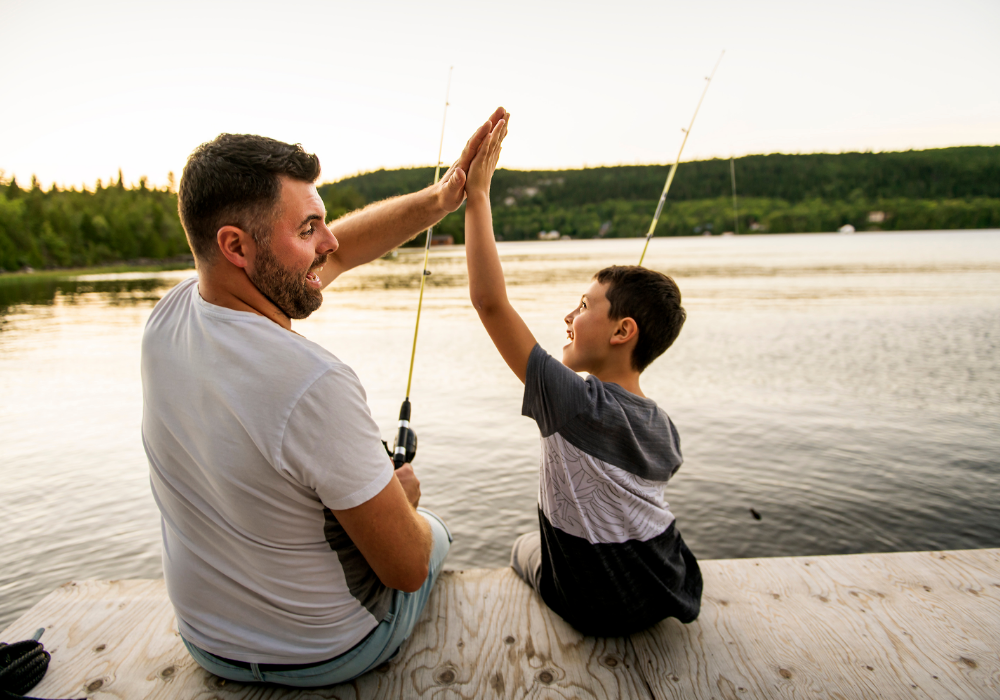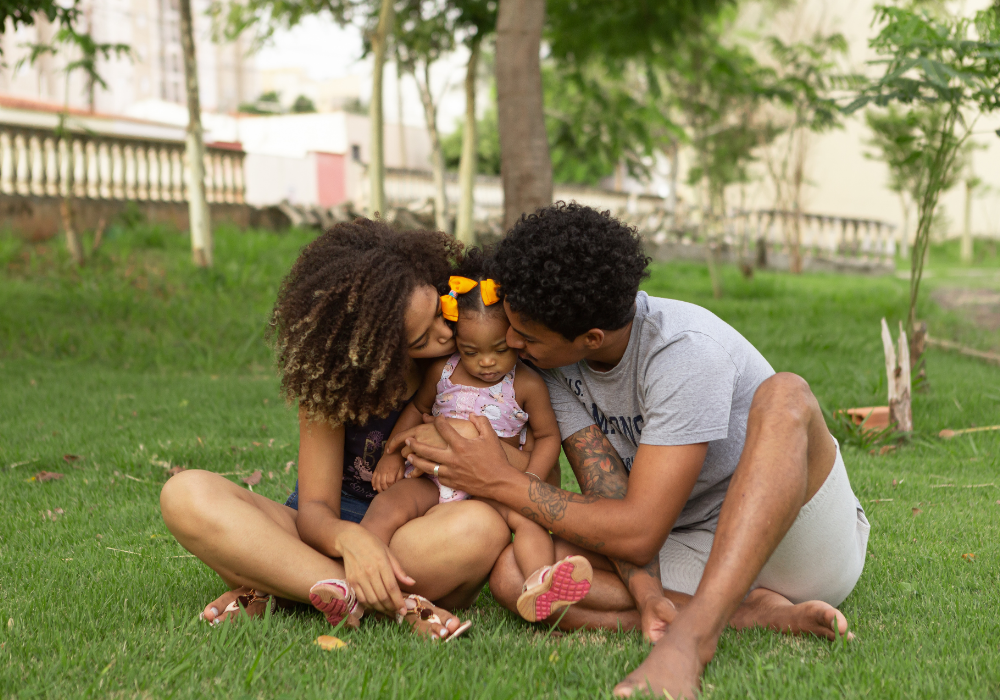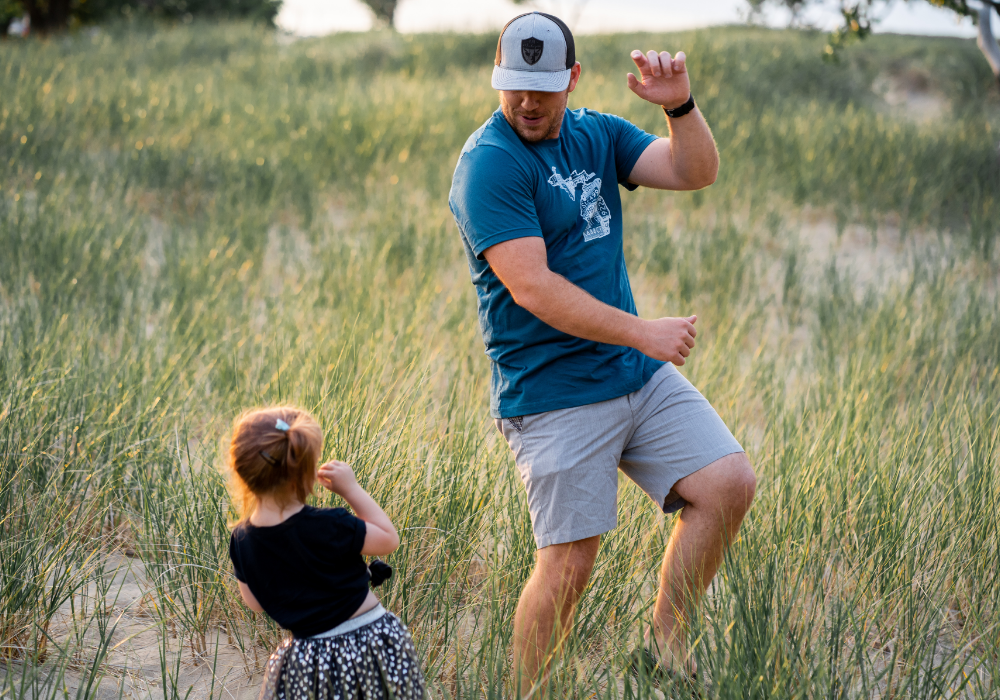It’s not about being the provider anymore—it’s about being present.

The idea of a good dad used to be simple: bring home a paycheck, show up to the big games, maybe teach your kid how to ride a bike or fix a tire. That was enough. Or at least, it was supposed to be. But something’s shifted. Today’s fathers aren’t just following inherited scripts—they’re rewriting them. They’re questioning what it means to raise a whole human, not just support one. They’re asking how to nurture, not just provide.
It’s not always easy. Many were raised in households where emotions were private, discipline was rigid, and vulnerability wasn’t modeled—let alone accepted. But a new kind of fatherhood is emerging, shaped less by tradition and more by intention. The questions dads are asking now go deeper than logistics or discipline. They’re about identity, healing, connection, and legacy. And the answers are reshaping what fatherhood looks like—for good.
1. How do I raise a child who feels safe talking to me?

It sounds simple, but creating emotional safety takes more than just saying “you can tell me anything.” Professionals at The Healthy Child Co. explain that children assess emotional safety based on how caregivers react during moments of distress, fear, or failure. If your first reaction is anger or dismissal, they learn to stay quiet. If it’s curiosity and calm, they come closer next time.
For many dads, this means unlearning their own instincts. Maybe you weren’t given space to cry or express fear growing up, so it feels unnatural—or even uncomfortable—to invite those emotions from your kid. But safety doesn’t mean softness.
It means reliability. Emotional safety is built in the small, consistent moments where your child learns they won’t be punished for being human. That kind of trust lasts far longer than any rule or routine.
2. What patterns from my childhood am I passing down without realizing?

It’s one of the hardest questions to ask—and one of the most important. So much of parenting is autopilot. You repeat what you absorbed as normal, even if it didn’t feel good at the time. Jessica Koehler, Ph.D., writes in Psychology Today that these patterns often include how families managed emotional expression, discipline, and achievement expectations. These things shape your responses before you even realize you’re reacting.
Taking the time to reflect on those patterns isn’t about blame—it’s about freedom. When you name what wasn’t helpful, you make space to do things differently. You get to decide which parts of your upbringing were worth keeping, and which ones deserve to end with you. That kind of self-awareness is a gift—not just to your kid, but to yourself.
3. Am I parenting with fear or with connection?

According to Alyssa Patel on iCounseling Solutions, fear-based parenting often leads to reactive, controlling behavior that undermines a child’s sense of emotional safety. It tries to control outcomes—grades, behavior, safety—through threats, punishments, or shame.
Connection-based parenting takes more effort, because it starts from the inside. It asks: what’s really going on with my kid right now? Why are they acting this way? What do they need from me?
Sometimes the answer is structure or limits. Other times, it’s closeness. The hard truth is, you can’t always prevent your kid from messing up—but you can be the one they come to when they do. That’s the power of parenting from connection. It builds trust that lasts through the rough years, not just the easy ones. And it requires you to check your fear at the door, again and again.
4. How do I model emotional regulation when I wasn’t taught it?

Anger, frustration, shutdown—these reactions are often the only ones men were allowed growing up. Vulnerability, sadness, or anxiety were framed as weakness, not truth. So when your child has a meltdown or pushes your limits, your nervous system might go straight to fight or flight. Not because you’re a bad parent—but because no one showed you what else was possible.
Learning to pause, breathe, and name your feelings in front of your kid is powerful. It doesn’t mean bottling up your reactions—it means showing them that big emotions don’t have to explode or disappear. You’re teaching them how to feel through something instead of around it. And maybe, for the first time, you’re teaching that to yourself too.
5. What does being a “provider” really mean now?

Providing used to mean one thing: money. But in homes where both parents work—or in families with different structures—that definition has evolved. Kids don’t just need financial stability. They need presence, attention, and someone who shows up for bedtime, school events, hard conversations, and ordinary moments.
Providing emotional safety, healthy meals, routines, and downtime matters just as much as providing income. So does helping carry the mental load—remembering appointments, packing lunches, managing the chaos of family life. If you’re showing up emotionally and logistically, even when you’re tired or overwhelmed, that’s providing. And it might be the kind your kids remember most.
6. How can I build trust without demanding obedience?

It’s tempting to equate respect with control: “They’ll listen if they respect me.” But real respect doesn’t grow out of fear—it grows out of mutual trust. Kids aren’t robots, and trust isn’t built through barked orders. It’s built when your child knows their voice matters, even when you’re the one making the final call. That doesn’t mean being permissive. Boundaries are still essential. But the way you enforce them shapes your child’s internal voice.
Are you teaching them to think critically and speak up—or just to follow rules blindly? When trust is the foundation, they’ll still challenge you sometimes. But they’ll also come to you when it counts. And that’s worth more than instant compliance.
7. Am I making space for my child to be different from me?

It’s easy to imagine raising a little version of yourself—someone who shares your interests, beliefs, personality, or temperament. But kids come into the world with their own wiring, and sometimes it’s wildly different from yours. Maybe they’re more sensitive. Maybe they challenge rules, or think in ways you don’t understand. The question is: can you hold space for who they are, not who you expected?
This isn’t about becoming a passive parent. It’s about learning to see your kid clearly, without the filter of your own unfulfilled dreams or unresolved fears. Letting go of the fantasy is hard—but it’s also freeing. When a child feels seen and accepted for who they are, they grow up with a stronger sense of self. And when a father can embrace that difference, even when it’s uncomfortable, he builds a deeper kind of love—one based on presence, not projection.
8. What am I teaching my child about masculinity?

Whether you’re raising a son, a daughter, or a nonbinary child, your relationship to masculinity will shape theirs. They’re watching how you handle anger, how you talk about emotions, how you treat your partner, how you cry—or don’t. Masculinity doesn’t have to be stoic or dominant. It can be strong and tender, protective and gentle.
This is especially powerful if you’re working to undo harmful models you were shown growing up. Every time you break a pattern—by apologizing, by expressing empathy, by asking for help—you’re showing your kid a different way. You don’t have to have all the answers. Just asking the question puts you on the right track. And when masculinity expands beyond toughness, it becomes a force for healing—not just for you, but for everyone around you.
9. Do I expect my partner to manage our family’s emotional life?

Too often, emotional labor becomes invisible—until it burns someone out. If you have a partner, ask yourself: who notices when the kids are overwhelmed? Who books the therapy appointments, remembers birthdays, smooths over meltdowns, or navigates friendship drama? It’s not just about helping—it’s about sharing the responsibility of emotional attunement.
Being an emotionally present father means stepping into this role fully, not just “assisting” when asked. It’s noticing without being prompted, offering support without being reminded. And if you’re parenting solo, this question still matters.
How are you handling that labor? Where are you overextending? Where can you bring in help or offer yourself grace? Emotional presence isn’t a bonus skill—it’s core to raising emotionally resilient kids.
10. How do I handle it when my child doesn’t like me?

There will be moments—sometimes whole seasons—when your kid pulls away. Maybe they’re angry, embarrassed, or just trying to assert independence. It stings. And it’s easy to take it personally, to tighten your grip or withdraw emotionally in response. But this is where the real work of fatherhood begins.
Can you hold steady through their frustration? Can you stay loving and available, even when they say they don’t want you around? Being a safe base means accepting their emotions without making it about you. That doesn’t mean allowing disrespect—but it does mean seeing their behavior as communication, not rejection. Kids test love to see if it holds. When you stay close without chasing or punishing, you show them it does.
11. What do I want my child to remember about me?

Years from now, your child won’t remember most of the rules you enforced. They’ll remember how it felt to be around you. Did they feel safe? Did they feel understood? Did you laugh with them? Apologize when you messed up? Show up when it mattered? These moments add up to the story they’ll tell about who you were in their life. It’s not about being perfect. It’s about being present—and human. Your legacy won’t be the trophies or routines.
It’ll be the small, sacred things: the way you said goodnight, the way you comforted them when they cried, the way you made space for their feelings. Ask this question often. It will point you toward what matters most.
12. Am I parenting in a way that helps me grow, too?

The truth is, parenting isn’t just about raising a child—it’s about raising yourself. Every hard moment your child brings to you is also an invitation to heal something in you. The tantrum that triggers your anger? The silence that stirs your fear of disconnection? These are reflections. Mirrors. And if you’re willing, they become doorways to growth.
Fatherhood asks a lot of you. But it also gives you something profound: a reason to become more self-aware, more grounded, more whole. When you meet your child with openness, you meet yourself with it too. That’s the real transformation. You’re not just shaping a life—you’re reshaping your own.
